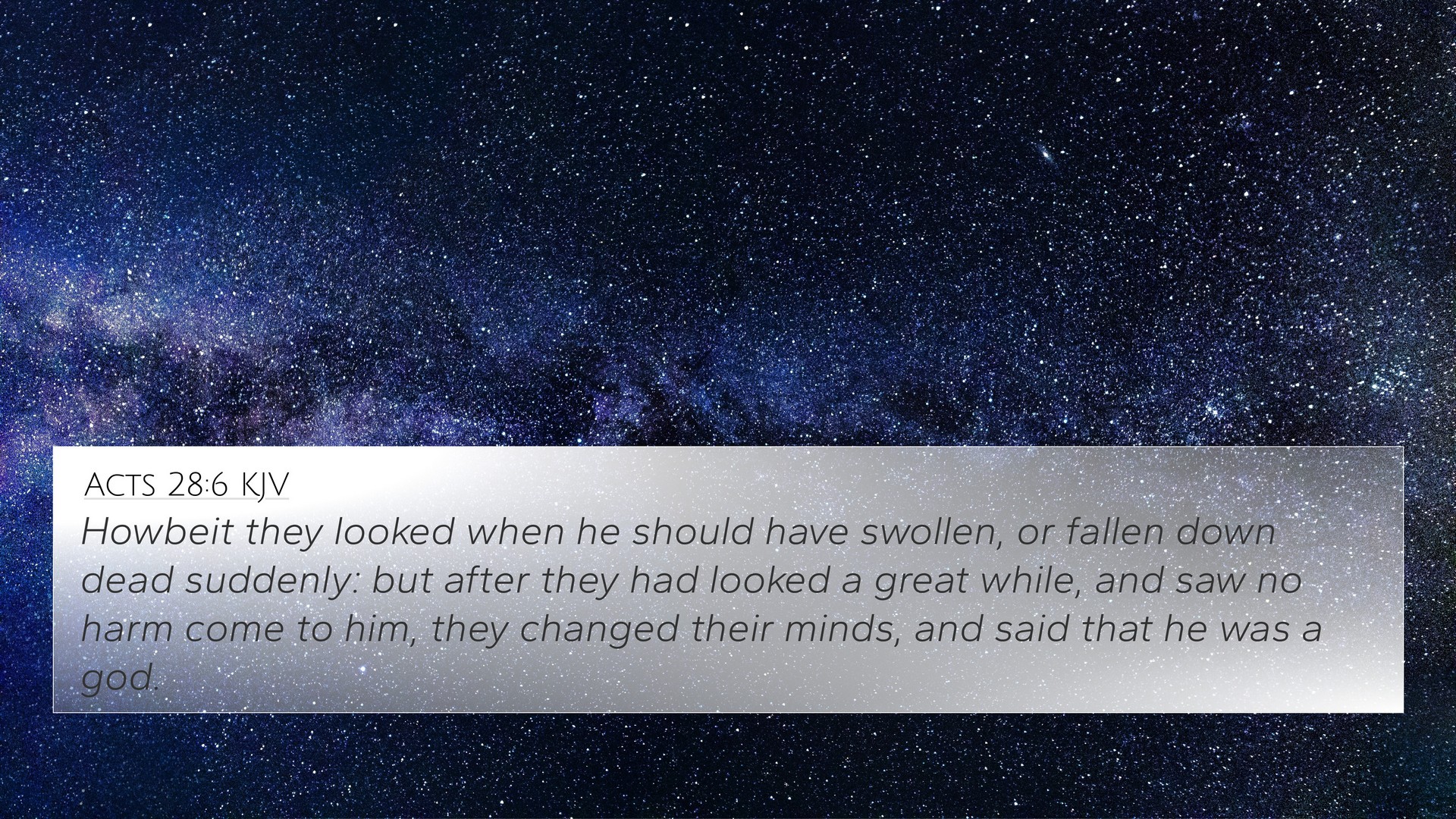Understanding Acts 28:6
Acts 28:6 states: “But when they were longed to see, and saw no harm come to him, they changed their minds, and said that he was a god.”
This verse concludes the narrative of Paul's shipwreck on the island of Malta, where he experiences divine protection and healing. The reaction of the locals highlights the theme of miraculous events leading to a misinterpretation of divine power.
Contextual Background
To understand Acts 28:6, it is essential to consider the broader context of Paul's journey. Having survived a storm at sea and cast ashore, Paul’s initial encounter with the islanders merges elements of fear, superstition, and wonder.
Exegetical Insights
The verse illustrates a transformational moment where the locals shift from expecting Paul to die (due to a snake bite) to declaring him a god. This transition reflects:
- Human Misunderstanding: The locals misinterpret Paul’s miraculous survival as an indication of divinity.
- Divine Sovereignty: Paul’s resilience is a testament to God’s protective hand over him, reaffirming that the true power belongs to God alone.
Thematic Connections
This verse touches upon several themes found throughout Scripture:
- The Power of God: Acts 14:11-15 illustrates another instance of divine acts leading to misinterpretation.
- Faith Under Trial: 2 Corinthians 12:9 reflects Paul’s assurance of God’s grace during adversity.
- Miracles and Signs: John 4:48 indicates Jesus’ view on the relationship between miracles and belief.
- Misplaced Honor: Acts 10:26 and Revelation 19:10 warn against the worship of humans rather than God.
- Cultural Superstitions: Acts 17:22-23 highlights how the Athenians also exhibited a misunderstanding of divine interactions.
Bible Verse Cross-References
The following Bible verses relate to Acts 28:6, offering deeper insight into its theological implications:
- Acts 14:11-13: Locals misinterpret healing as divine endorsement, reinforcing the danger of human attribution of godhood.
- Romans 1:25: Discusses the folly of exchanging the truth of God for lies.
- 1 Corinthians 8:5-6: Examines the notion of ‘gods’ in various cultures, pointing toward a common misunderstanding.
- Galatians 4:8: Paul discusses the transition from ignorance of God to knowledge, contrasting paganism with the true gospel.
- Acts 19:27: Illustrates how fear of losing worldly power can lead to hostility against true faith expressions.
- Colossians 2:18: Warns against being drawn into false humility and worship of angels, linking to the theme of misdirected reverence.
- Matthew 4:6: Satan’s misuse of scripture to test Jesus’ divine identity resonates with this misattribution of divinity.
Comparative Bible Verse Analysis
This moment invites a comparative analysis with various Biblical accounts where people misinterpret divine acts:
- When Moses performs miracles in Egypt, Pharaoh's hardened heart illustrates a similar response to divine signs (Exodus 7-12).
- The Kingdom of Israel misreads the purpose of the prophets, which highlights a recurring theme of misunderstanding God’s messengers.
Conclusion
Acts 28:6 serves as a reminder of the importance of discernment in recognizing God's work. It challenges us to understand that divine actions should lead us to glorify God rather than attributing divine status to mere mortals.
When studying this verse, it’s helpful to use Bible cross-reference guides to explore connections between Bible verses that enhance our understanding of God's narrative.
Further Study and Tools
Utilizing tools for Bible cross-referencing can significantly enrich one’s study of Acts 28:6. A Bible concordance can aid in identifying key themes and linked verses for deeper exploration:
- How to find cross-references in the Bible effectively by thematic studies.
- Bible chain references from one verse to another can create a more comprehensive understanding of the interconnectedness of Scripture.






